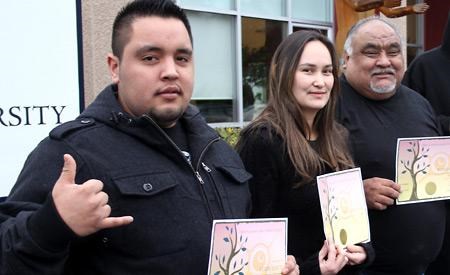Sometimes the hardest part of moving forward is taking those first few steps.
For a group of Tla’Amin (Sliammon) First Nation people this problem has been overcome as they graduate from the first Sliammon Step program to be taught at Vancouver Island University’s (VIU) Powell River campus.
At an unofficial but touching graduation ceremony at the end of class on Friday, January 6, those present of the 15 students in the program received their certificates for completion, signifying a job well done and the opportunity to take the next step.
The 12-week program is run as a partnership between VIU, Tla’Amin, the First Nations Employment Society (FNES) and School District 47. Funding for the program, which is free for all students, is provided through Service Canada.
In the program students are either refreshed or taught for the first time basic skills needed in order to enter the workforce or go on to further education. The course teaches participants math, writing skills, document use, group work, computer skills and other essential skills for employment. Students also studied and discussed first nations’ history and issues related to current affairs.
David Doyle, the program’s instructor, said he has been teaching for 35 years and that being involved with this program has been the peak of his career. Doyle has previously worked as a principal at first nation schools and a manager of education in the Yukon.
“I’m really pleased with the progress that the students made academically, socially and culturally,” said Doyle. “I also really feel strongly that they themselves have given me a new understanding of some of the challenges that they face and the strategies they’ve used to overcome them.”
Students graduating from the program ranged from their early 20s to their mid-50s, but all were there for the same reason: to get a hand taking that first step toward changing their lives.
Many of the students spoke of continuing on with education to earn their high school diplomas or going into training for trades or other opportunities. There was an obvious camaraderie and excitement in the room as the students spoke of their experiences in the course and on their plans for the future.
Cody Louie dropped out of high school sometime around grade 10 or 11. Louie said he heard about the program from Walter Paul, job coach with FNES, and decided to do it because he had been working on a fishing boat and he wanted to pursue something else. Louie plans to continue on with his education and earn his grade 12 equivalent. From there he plans to take training for operating heavy equipment.
“Just needed a little refresher, a jump-start,” said Louie. “I liked the course and it was pretty important just to get me back into the schooling, to get my mind fresh on all the math and writing and everything.”
Randy Harry is 56 years old and now has a goal to get his grade 12 equivalent education before his two sons do. Like him, both of his sons didn’t finish school and now Harry plans to set an example. Harry has worked as a logger for most of his life but can no longer do the work. He heard about the Sliammon Step program only a couple of days before it started and decided to sign up. Harry now plans to go for his ABE (adult basic education) and then hopes to work as a driver.
“The potential, with the free education we got and the amount of trades that anybody can go after, is unlimited,” said Harry.
As for his sons, “I don’t think they like the idea of me beating them to grade 12,” said Harry, “but I’m pretty sure they’re proud of their dad.”
Running the program through the university makes a big difference for the students, according to Doyle. The setting allows participants to feel like regular students and gives them access to all of the resources the university has available.
Brandon Stiles, essential skills manager for FNES, visited Powell River to attend the graduation. Stiles said similar programs have been successful in helping first nations people take that first step into the workforce.
“They have the tools now to be able to be successful in their endeavours and start participating in the workforce and move up the ladder,” said Stiles. “These are participants that have had a little bit of a rough go, so I think that it’s really important to be able to give them an opportunity to get the basic tools to be able to start moving forward with their lives and their goals.”
Paul has taught a number of job skills-related programs for Tla’Amin residents. He believes that training the young people to enter the job market will benefit the community as a whole, especially should Tla’Amin become more financially independent in the future.
“The labour market is very slow right now but it will pick up and we would need to have our people ready at the time when those jobs do come up,” said Paul. “We have a young population, all our first nations have a very young population...we need to start training.”
Paul said the program will run again, potentially as early as February, and that other essential skills programs will continue to be run in Tla’Amin.



